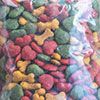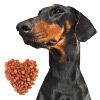dvm360 Leadership Challenge-Mission: Nutrition
The internet is rife with arguments about what to feed pets. Veterinary professionals should be at the heart of that discussion, but they often find themselves pushed to the fringe.
The world of pet nutrition used to be a calmer, more boring place. Suffice to say, those days are long gone. Now your veterinary clients are all but hunting and gathering for their pets (we're kidding-we hope) and trying every fad that's advertised to them on Instagram. Veterinary professionals are caught in the middle of a storm of pet food myths, misconceptions and, yes, some bright spots, too. Here's everything you need to know to better guide your clients, your team and your patients toward the best sources of nutrition they can get-plus, get a (sometimes wild) peek into what your peers are experiencing in the exam room.
The big picture

The dark side of pet nutrition: Mythmongering, irrationality-and passionate devotion
When your veterinary clients hold fast to their deepest beliefs about what's best (and worst) for their pet to eat, you make think they're crazy-but it's also because they care.

The bright side of pet nutrition: Food and the human-animal bond
Mealtime and treats are a huge source of warm fuzzies for people and their pets-something veterinarians should recognize and celebrate. But there's danger lurking in the shadows: obesity, pancreatitis and other problems of overindulgence.

What's in the bag? A checklist for evaluating pet food options
Even a veterinary nutritionist can't be familiar with every diet available for dogs and cats. Here's how to tell quality from quackery.

Food for thought: New data on nutrition for veterinary clients
Find out how often veterinarians discuss nutrition with clients, how often clients ask and the biggest prompt for discussion in this data from the 2019 dvm360 Nutrition Study.

The biggest pet nutrition headaches for DVMs
Did you think you'd be fielding this many nutrition questions in the veterinary clinic? Neither did your colleagues, according to the 2019 dvm360 Nutrition Study.

Can pets eat vegan? Definitely maybe, says Dr. Ernie Ward
Ideal canine and feline diets should be based on individual pet needs and growing science around nutrients-not opinion, philosophy or views of what's culturally acceptable, says this nutrition-minded veterinarian.

Journal Scan: DCM and boutique dog foods: Can taurine supplementation help?
A recent large-scale study evaluated whether supplementing the diet with taurine and L-carnitine can help manage dilated cardiomyopathy in dogs.
Client interactions

Clients feeding homemade or raw? Drop the judgment
You may not want to hear it, but clients' interest in unconventional diets isn't going away anytime soon. This veterinary nutritionist says it's time to listen to their reasons and work with them-not shut them down.

Vet confessions: Grain-free diets and overweight pets
These veterinary professionals reveal awkward client encounters surrounding nutrition and their own feelings about overweight pets.

When pet owners put the ‘nut' in ‘nutrition'
We asked your veterinary peers for the craziest nutrition conversations they'd had with pet owners, and, boy, they did not disappoint.

Client handout: Are grain-free diets causing dilated cardiomyopathy (DCM) in dogs?
The science is out on the topic, but the U.S. Food and Drug Administration is collecting cases. Share the basics with your veterinary clients with this printable handout.
Tips and tools

Be the best source of pet food info for your veterinary clients
Vet teams: Don't underestimate the power of your guidance when encouraging pet owners to make objective decisions about pet food. You're better armed than you think.

Guide to veterinary recalls and adverse event reporting
Here are the best resources for staying up-to-date on pet food and other recalls affecting veterinary practice. Plus, where and how to report product issues and adverse events with the right government agencies.

Use Instagram to bust pet food label myths
Your veterinary clients are using social sites like Instagram to gain information on how to best care for their pets. This is where you and your clinic come in.

Pearl of Practice: Make samples that lead to sales
A veterinary client returns a bag of therapeutic food that their pet refused to eat. Turn it into samples so future clients can test the food out before buying it.

Practice tip: Therapeutic diet? It's in the cart
If the veterinarian is recommending a therapeutic diet for a patient, put it in the online cart and set up reminders to increase client compliance.
Podcast CE: A Surgeon’s Perspective on Current Trends for the Management of Osteoarthritis, Part 1
May 17th 2024David L. Dycus, DVM, MS, CCRP, DACVS joins Adam Christman, DVM, MBA, to discuss a proactive approach to the diagnosis of osteoarthritis and the best tools for general practice.
Listen